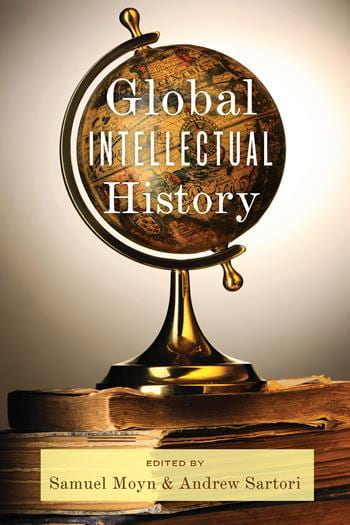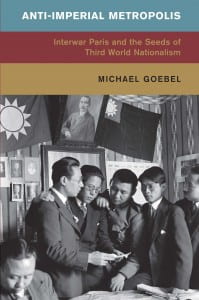by guest contributor Sarah Dunstan
 Speaking of the emerging calls for transnational and global intellectual history in a 2011 article, David Armitage wrote that ‘[w]hat is certain is that the possibilities for such a global history – or even for multiple histories under this rubric – remain enticingly open-ended.’ In the five years that have passed since that article’s publication, scholarship contemplating the potential of such a history has proliferated. Not least of these contributions is Samuel Moyn’s and Jeremy Sartori’s brilliant edited collection Global Intellectual History, published in 2013. That volume – like their essay posted on the Imperial & Global forum – sought to ask the hard questions about the idea of ‘global intellectual history’ – not only questions of how historians might write such histories but whether or not the sub-field should exist at all. The diverse range of approaches that appear in the volume itself certainly speak for the multiplicity of possible understandings and methodologies historians might adopt.
Speaking of the emerging calls for transnational and global intellectual history in a 2011 article, David Armitage wrote that ‘[w]hat is certain is that the possibilities for such a global history – or even for multiple histories under this rubric – remain enticingly open-ended.’ In the five years that have passed since that article’s publication, scholarship contemplating the potential of such a history has proliferated. Not least of these contributions is Samuel Moyn’s and Jeremy Sartori’s brilliant edited collection Global Intellectual History, published in 2013. That volume – like their essay posted on the Imperial & Global forum – sought to ask the hard questions about the idea of ‘global intellectual history’ – not only questions of how historians might write such histories but whether or not the sub-field should exist at all. The diverse range of approaches that appear in the volume itself certainly speak for the multiplicity of possible understandings and methodologies historians might adopt.
As is clear from Sanjay Subrahmanyam’s critical review of Global Intellectual History in History and Theory, there remain those uncomfortable with the addition of the term ‘global’ to the sub-field of intellectual history. Subrahmanyam worries that the use of the word ‘global’ is just another fad that offers little analytical benefit. Moyn and Sartori have convincingly responded to his criticisms of Global Intellectual History but Subrahmanyam’s review, like the volume itself, illustrates rather clearly that we have certainly not arrived at a consensus for what might constitute such a history. Questions abound, including: Who do we mean when we use the term ‘intellectual’? How do we approach the spread and reception of an idea, particularly when we consider the permutations and changes that occur to ideas when they cross linguistic and cultural barriers? What role is played by the everyday experiences of the men and women whose ideas travel the world?
 One possible way of answering these questions lies in the latest book from the German historian, Michael Goebel. Entitled ‘Anti-imperial Metropolis: The Seeds of Third World Nationalism’ the book foregrounds the role of migration to and from interwar Paris as a precipitating force in creating movements against imperial structures. Crafting a compelling narrative that rests upon a platform of meticulous archival research, Goebel argues that the experiences of migrants in interwar Paris were a significant catalyst for the spread of nationalist thinking and anti-imperial movements both within the French empire and beyond.
One possible way of answering these questions lies in the latest book from the German historian, Michael Goebel. Entitled ‘Anti-imperial Metropolis: The Seeds of Third World Nationalism’ the book foregrounds the role of migration to and from interwar Paris as a precipitating force in creating movements against imperial structures. Crafting a compelling narrative that rests upon a platform of meticulous archival research, Goebel argues that the experiences of migrants in interwar Paris were a significant catalyst for the spread of nationalist thinking and anti-imperial movements both within the French empire and beyond.
As Moyn and Sartori have argued, one of the key questions facing historians attempting to construct global intellectual histories pertains to the exploration of the ‘historical processes that have made intellectual exchange and connection possible beyond conventional national boundaries.’ The vehicle of migration is not one that has been unattended in the historical literature on Paris but it is one that deserves more attention in intellectual histories, as Goebel demonstrates. Rather than conceptualising his historical actors as ‘intellectuals’, Goebel treats them first and foremost as migrants or, as he calls them, ‘ethno-entrepreneurs’. This approach is key because it allows him to interrogate community formation as the origins of intellectual connections between groups that are usually studied as distinct entities. In the case of Paris, historians have long assumed physical proximity as suitable causation. Goebel, however, takes this thinking further, demonstrating how physical proximity in conjunction with the experience of similar pressures, despite linguistic and cultural difference, made becoming anti-imperial a transcultural phenomenon, albeit one that manifested in myriad forms across different migrant groups. As such, Goebel’s methodology is a departure from more traditional intellectual histories. He himself acknowledges that his work is ‘much more of a social history of migration than an intellectual history of anti-imperialism’ but he contends that it is impossible to understand the processes behind the latter without the context of the former.
Goebel’s argument about the significance of treating these individuals and groups as ‘ethno-entrepreneurs’ rather than intellectuals, as migrants rather than activists, is most compelling for groups such as the Algerian and Vietnamese communities. The Latin-American presence in Paris during this period is not usually treated by migration histories, not least because they comprised a much wealthier echelon of Parisian society during the period. Their own accounts of the time spent in the French metropole, however, characterise it as a turning point in their political development. For example, this may have owed less to the socio-economic hardship endured by the Algerian or black African contingents and more to the opportunities it offered for exchange between members of Latin American countries not usually in contact. Goebel argues that this created a sharper sense of solidarity against US imperialism. What’s more, the gap in opportunity between those who were subjects of the French empire and those who were foreigners in the French capital, also impelled thinkers grasping for a cogent understanding of their situation to come to terms with the realities of imperialism.
Goebel thus argues we can trace the global spread of the claim for national sovereignty to the urban space of interwar Paris. Goebel’s work is outstanding and his study might yet provide a methodological blueprint for writing ‘global intellectual history’. Of course, there will be those who question the combination of social and intellectual history. Paris, too, might be a unique case. In the book’s conclusion, Goebel points to the sheer magnitude of the populations of colonial subjects in the city during the interwar period as exceptional. Likewise, for the purposes of pursuing an intellectual genealogy of nationalism and anti-imperialism, it is impossible to ignore the significance of the republican discourse embedded in the Parisian political landscape, a feature that was not so true of cities such as London or Berlin. Moreover, in privileging the examination of community and group formation over a more intensive study of the individual trajectories of those individuals who were at the forefront of anti-imperial movements later on– like Ho Chi Minh, Zhou Enlai, Léopold Senghor – it is impossible to get at the nuances of their ideological development. Of course, Goebel’s study never set out to do such a thing: my comment here is not a criticism of his work but is instead an observation about the implications of anchoring an intellectual history so firmly in a social history framework.
By focusing in upon the pathways of the Parisian landscape, both literal and figurative, Michael Goebel has offered a persuasive study that goes some way in answering the question of why nationalism and anti-imperialism became ‘global’ ideas in the aftermath of World War II. His work elegantly links the ‘local’ with the global’ through the meticulous exploration of rich archival sources not usually studied in tandem. The kinds of substantive and methodological questions it raises for the practice of ‘global intellectual history’ are sure to invite a great deal of reflection and debate. Personally, I would like to suggest that Anti-Imperial Metropolis itself is a persuasive argument for intellectual historians to explore the possibilities of social history as a means to understanding the ways that intellectual exchange was facilitated on a global scale. For the moment, it seems as if ‘global intellectual history’ is here to stay, an observation confirmed by the launch in the last fortnight of a new journal, Global Intellectual History.
Sarah Dunstan is a PhD Candidate on an Australian Postgraduate Award at the University of Sydney. She was a Fulbright Postgraduate Fellow at Columbia University New York for the 2014-2015 academic year and is currently a Visiting Postgraduate Scholar at Columbia Global Centers, Paris. In 2016, she was awarded the James Holt Prize for the best article published in the Australian Journal of American Studies in the previous two years. She has a new article forthcoming in Callaloo. Her research focuses on francophone and African American intellectual collaborations over ideas of rights and citizenship.

This work is licensed under a Creative Commons Attribution-NonCommercial-NoDerivatives 4.0 International License.
Latest posts
- Becoming Contra: An Analysis of Rights of Non-Human Sociopolitical Belonging
- A Rebirth of Islamic Republicanism?On the Centenary of the Abolition of the Ottoman Caliphate
- “The Black Woman”: Black Women Activism within Documentary Films in the 1960s United States
- Transnational Social Democracy: The Socialist International and the Friedrich Ebert Foundation in Latin America
- How Reason Encountered Work: The Encylopédie and the Métiers

5 Pingbacks